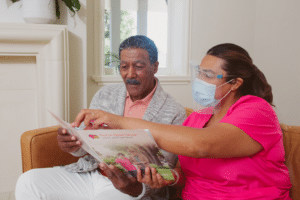Your Comprehensive Guide to End-of-Life Care (2023)
Death is a natural part of life. As difficult as it is, we will all experience it at some point. It is a time when a dying person and their loved ones may require additional love, support, and guidance to cope with their emotions and make important decisions about their care and life. Caring for someone in the final stages of a terminal illness can be emotionally taxing and challenging.
This article will explore end-of-life care, covering everything from caregiving in the final stages to coping with grief and loss. Our sympathetic Care Team is here to support you and your loved ones throughout this journey, providing guidance and care every step of the way.

What is End-of-Life Care?
End-of-life care is provided to individuals who reach a critical time in their health and life. It is a time when a dying person needs specialized medical care and comfort measures that prioritize their quality of life over the number of days they have left. Family members and individuals need the utmost support, comfort, empathy, and compassion when end-of-life care is required.
End-of-life care is an umbrella term for mainly two types of care: “palliative care” and “hospice care.” They are two essential components of end-of-life care that focus on managing symptoms, easing pain and discomfort, providing emotional support, and helping patients maintain their dignity and autonomy in their final days, weeks, or months.
Late Stage Care
Late-stage and end-of-life care are not the same, but they can overlap in some cases. Late-stage care refers to medical care provided to individuals with a serious life-limiting illness that has progressed to an advanced stage. This may include individuals still receiving curative treatment and hope to recover; many cancer patients fall into this category but whose condition is deteriorating despite medical intervention. Whereas end-of-life care focuses on comfort care for people who may no longer seek curative treatment.
Palliative Care
A specialized type of medical care called palliative care aims to relieve symptoms, pain, and stress associated with seriously ill patients at any stage of their disease. Palliative care is provided by a team of healthcare professionals, including doctors, nurses, social workers, and spiritual counselors, who provide comprehensive support to clients and their family members.
Palliative care aims to improve the person’s quality of life by addressing their physical, emotional, and spiritual needs rather than focusing solely on curing their illness. Like hospice, palliative care places great importance on communication and shared decision-making between patients, family members, and the healthcare team. However, palliative care is not limited to individuals with terminal illnesses, unlike hospice care. Palliative care can be provided concurrently with curative treatments.
Hospice Care
Hospice care is a specialized type of end-of-life care specifically designed for those with a terminal illness with a life expectancy of six months or less. Hospice care, similar to palliative care, strives to ensure patients are as comfortable and pain-free as possible while providing emotional and spiritual support to individuals and their family members. The hospice care team is made up of hospice staff and health care professionals specializing in end-of-life.
Hospice and palliative care are vital components of the continuum of care for individuals living with a life-limiting illness. Both types of end-of-life care can help individuals and their loved ones navigate the complex medical decisions and emotional challenges of any serious illness.
For more information on the differences between palliative care and hospice, visit: End-of-life Care vs. Hospice: Understanding the Differences
Where Can A Dying Person Receive End-of-Life Care?
There is no one-size-fits-all approach to end-of-life care; everyone is unique, and every circumstance is different. Where a dying person receives care will depend on their unique needs and a patient’s wishes. Some individuals may prefer to receive care in a hospital or hospice facility, where they can access specialized medical equipment and supportive care. Others may wish to remain home surrounded by a familiar environment and comforts. Home-based end-of-life care is becoming increasingly popular thanks to its many benefits.
Palliative medicine and care provided in the home is a wonderful option for individuals who wish to be surrounded by familiarity while remaining close to their loved ones. Home-based palliative care, in particular, is a great option for those who wish to remain in the comfort of their own home for as long as possible. A team of healthcare professionals, including nurses, social workers, and spiritual counselors, provide palliative care services that can manage physical symptoms and address mental and emotional needs.
Ultimately, the choice of where to receive end-of-life care is deeply personal, and individuals and family members need to explore all available options and plan accordingly. Individuals needing end-of-life care may explore the following options for where they can receive care:
- Hospital: Many hospitals have specialized units for end-of-life care, where patients can receive medical and comfort care from a team of healthcare professionals.
- Hospice facility: Hospice facilities provide specialized care for individuals with terminal illnesses with a life expectancy of six months or less. These facilities offer a home-like setting where patients receive around-the-clock care and support.
- At Home: Home-based end-of-life care is in demand as individuals can receive palliative care, hospice care, or a combination of both in the comfort of their own homes.
- Nursing home: Some nursing homes may offer end-of-life care services, such as palliative care or hospice care, for residents nearing the end of their lives.
- Residential hospice: Residential hospices are similar to hospice facilities but are typically smaller and offer a more home-like environment.
- Palliative care clinic: Palliative care clinics offer outpatient care for individuals with serious or life-limiting illnesses. Patients can receive pain and symptom management, emotional support, and care coordination.
- Inpatient hospice unit: Inpatient hospice units provide specialized end-of-life care in hospitals.
For more information on palliative care at home, visit: Palliative Care At Home: Understanding Your Options

Who Makes Up the End-of-Life Care Team?
When someone approaches the end of life, their health care team may adapt and change throughout the dying process. Depending on the type of illness, a health care team may comprise several healthcare professionals and specialists to help an individual and their family cope and manage during this difficult time.
The end-of-life care team can be made up of several healthcare professionals who work together to deliver comprehensive care and support. Here are some of the healthcare professionals who may be part of an end-of-life care team:
- Primary Caregiver: is typically a family member or friend who takes on the responsibility and role of providing primary care to a dying person. They are responsible for personal care, coordinating arrangements, communicating with the health care team, and emotional support and companionship. The job of primary caregivers is quite demanding, and they can occasionally feel burnt out. If this is the case, respite care can support a primary caregiver and relieve them temporarily so they can rest and take the break they deserve.
- Doctors and nurses: Doctors and nurses play a critical role in end-of-life care, providing medical care and managing symptoms such as pain, nausea, and shortness of breath.
- Palliative Care or Hospice Staff: These are specialized professionals, typically nurses, who provide comfort, support, and end-of-life care. They work to manage symptoms and lessen pain and discomfort associated with a terminal illness.
- Social worker: may provide emotional and social support to clients and their family members while helping them navigate the complexities of a terminal illness and end-of-life care.
- Spiritual counselors: Spiritual counselors can offer spiritual care and guide individuals in their spiritual practices. These professionals provide emotional support and address spiritual needs by helping individuals and their families find comfort and meaning during the end of life.
- Home health aides: Home health aides provide personal care and assistance with daily living, feeding, bathing, dressing, and grooming.
- Occupational Therapists: can support a dying person at the end of life by helping them maintain and assess body functionality, provide adaptive equipment, facilitate meaningful activities, and provide supportive care.
- End of Life Doula: is a non-medical professional who takes a holistic approach to support individuals and families during the end of life. These professionals provide emotional, spiritual, and practical support while delivering comfort, companionship, and guidance to the dying person and their loved ones.
- Trained Volunteers: Volunteers can provide companionship and emotional support to patients and their families, offering a listening ear, a comforting presence, and practical support with tasks such as meal preparation and errands.
Together, these healthcare professionals make up the end-of-life care team. By working collaboratively, they can support patients and their families through the challenges of a terminal illness with dignity, compassion, and respect.
For more information on end-of-life care at home, visit: What Does End Of Life in Home Care Look Like?

When Is It Time for End-of-Life Care?
Determining when it is time for care to be provided at the end of life can be complex and emotional. There is no single right time to begin this type of care, and it will vary depending on the individual and the progression of their illness.
In some cases, with Alzheimer’s disease or with other dementias, doctors may recommend specific therapies and provide guidelines for planning ahead. However, for a different life-limiting illness, there are some signs you may want to look out for when considering hospice or palliative care.
- Frequent hospital visits and trips to the emergency room.
- A decision to stop receiving treatment for the illness.
- Wishing to remain at home rather than go to the hospital.
- Refusing or rarely eating or drinking.
- Difficulty breathing or any other severe symptoms related to their terminal illness.
It’s essential to have open and honest conversations with your loved one, doctor, and the rest of the care team to ensure they receive the support and care they need during this transitional time.
For more information on dementia for hospice or palliative care clients, visit: When Is Hospice Care Needed for Loved Ones with Dementia

Caregiving In the Final Stages of Life
As a loved one enters the final stages of their life, caregiving becomes even more essential. While each person’s symptoms and needs may vary, there are some common experiences near the end of life.
Caregiving in the final stages is focused on providing comfort and support. This time is best approached with compassion, patience, and understanding.
Here are some ways caregivers can support their loved one during the dying process:
- Provide comfort for common symptoms such as drowsiness, confusion, and loss of appetite.
- Be present with your loved one and talk to them softly and soothingly. It has been said that they can still hear you, even if they are unresponsive. Hearing is typically the last organ to go.
- Encourage conversations at a low level with family and friends in the room. Soothing conversations can comfort the person dying, knowing loved ones surround them.
- Physical touch is important and encouraged during the dying process. Hold hands, or touch them softly to remind them they are supported and loved.
- Keep your loved one clean, dry, and comfortable, and use disposable pads on the bed if necessary. Typically, your palliative care team or nurse can assist you with this.
- Keep your loved one warm with blankets, and avoid electric blankets or heating pads.
- Adjust the lights to soft lighting to ensure they’re not bothered by bright lights while resting.
- Physical comfort is key during this time. Position your loved one for easier breathing. Be very careful – their condition may require positioning by healthcare professionals.
- Remember to take care of yourself, as caregiving can be emotionally and physically demanding.
For more information on end of life support, visit: End of Life Support
Goals of End-of-Life Care
End-of-life care provides comfort, support, and dignity to the dying person and their loved ones. There are four main goals of end-of-life care including:
- Physical comfort and symptom management.
- Mental and emotional supportive care.
- Spiritual support.
- Practical support.
Caregivers and the healthcare team will strive to ensure that a terminally ill individual receives the best possible care at the end of life, including:
- Providing relief from pain and other distressing symptoms.
- Ensuring the person’s physical, emotional, and spiritual needs are met.
- Respecting the person’s end-of-life wishes and preferences regarding their care and treatment.
- Helping the person and their loved ones come to terms and find meaning in the dying process.
- Supporting the person’s loved ones with the grieving process and bereavement.
- Encouraging open and honest communication between the person, their loved ones, and their healthcare team.
- Strive to help a person achieve a good death while helping them make the most of the time they have left, whether that means spending time with family and friends, pursuing hobbies and interests, or engaging in spiritual or cultural practices.
For more information on the goals of end of life care, visit: Goals of End-Of-Life Care Explained

End-of-Life Care Planning
Preparing for the end of life involves deciding how an individual wants to be cared for in the final stages of life. This topic can be complicated to think about, let alone discuss, but it is essential to ensuring that end-of-life wishes are respected.
Some key aspects of planning ahead include:
- Advance care planning (advance directives): This involves deciding on medical treatments and interventions that a person wishes to receive or not receive and appointing a healthcare proxy (or a substitute decision maker) to make decisions on their behalf if they become incapacitated.
- Emotional and spiritual wishes: When planning for death, it should also involve discussing emotional and spiritual needs. This may include preferences for counseling and spiritual or religious community support.
- Financial planning: planning ahead for the end of life can save your family loads of debt and bills later on. Planning for these expenses and having a living will is recommended to avoid future burdens and disputes among family members. This may include discussing options for insurance, estate planning, and other financial arrangements.
- Choosing a location for care: Deciding on where to receive care is an integral part of planning. This may include choosing between hospice care, hospital care, or receiving care at home.
- Communication with loved ones: Involve loved ones in end-of-life care planning discussions, as they may be able to provide support and assistance in carrying out final wishes.
For more information on preparing for end-of-life, visit: Your Guide to End of Life Preparation

Coping with Grief and Loss
Coping with a loved one’s death can be one of the hardest things anyone must go through. The grieving process could be different for everyone. However, there are some tips to help navigate this difficult time:
- Acknowledge your emotions and permit yourself to grieve in your own way.
- Seek emotional support from family and friends or a professional therapist or counselor.
- Take care of yourself physically, emotionally, and spiritually by eating well, getting enough rest, and engaging in activities that bring you joy.
- Consider participating in grief support groups or grief counseling to connect with others who are going through a similar experience.
- Create a memorial or ritual to honor your loved one’s life and legacy.
- Be patient and kind with yourself as you navigate the ups and downs of grief. Remember that healing takes time and is a personal sacred journey.
For more information on grieving and resources, visit: End of Life Care Resources

What Are the Next Steps?
End-of-life care is a crucial aspect of the healthcare system that requires total compassion, understanding, and support from families and healthcare professionals. It is a time when clients and their families need the most care and attention to ensure that their final days are spent in comfort and with dignity.
Planning for late stages of care and accessing the support of a caring and compassionate team of professionals can make a world of difference. At Nurse Next Door, our services are designed to provide peace of mind to families and their loved ones. Our caregiving teams are always hardworking, respectful, and kind, lending the helping hand that they need. Our Care Team is always here to help you or your loved ones navigate the complexities of end-of-life care and ensure that any person’s final days, weeks, or months are spent with respect, comfort, love, and dignity.
Contact us today to learn more about how we can help you and your loved one with End of Life Care. Call us toll-free anytime at 1-877-588-8609.

